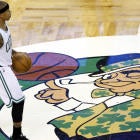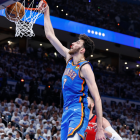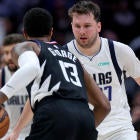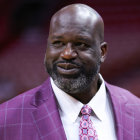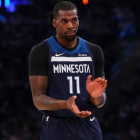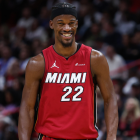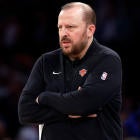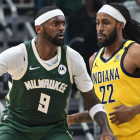The Boston Celtics are sitting pretty.
They are in the conference finals, and despite suffering the biggest margin of defeat in their playoff history (reaching back to 1947 no less), they took a game off the Cavs in Game 3, setting up a big Game 4. They also possess the No. 1 pick in the NBA draft lottery, which means they can add what could be a generational talent in Markelle Fultz.
Or... they could trade the pick.
The biggest trade target available is clearly Paul George of the Pacers. (Read more on his situation with the Pacers here.) The choice isn't binary, of course. The Celtics will clearly hope to trade for George without giving up the No. 1 pick. (And notably they also have Brooklyn's 2018 first-rounder to move.) They can trade for another superstar, if they can find the right deal. They could even draft someone besides Fultz. (They won't.) But what should they do? Let's break it down.
I. TRADE THE PICK FOR PAUL GEORGE
Reasons for:
- You made the conference finals. You are three wins away from making the NBA Finals. Add a player of George's caliber, and there's no reason to think that you'll come up short, or at least you have to believe you'll have a serious shot. The future is uncertain, but you know this team is good now. Take your shot while you have one.
- George fits perfectly with this team. You want to build around Isaiah Thomas, who has endeared himself so much to this town and this franchise, and George checks all the boxes alongside him. His defensive versatility helps mitigate your defensive issues with Thomas on the floor. Thomas is ball-dominant? George is lethal coming off screens. Want another creator offensively, especially when Thomas is off the floor? Have George take over running the offense when Thomas sits, or have him play with the bench units. There are no conflicts with George like there are with other trade targets, or, in some ways, with Fultz himself.
- The assets you have will not be assets forever. You have enough to trade for another superstar and really be in business. But after this year, you have Isaiah Thomas, Avery Bradley and Marcus Smart all up for being re-signed, plus Kelly Olynyk this summer. If you're not going to go all in with this core, now, you're looking at the possibility of a real rebuild, one that won't be buoyed by the Nets this time.
- What if LeBron James gets hurt, or suffers a decline finally? The door would be wide open for a trip to the Finals.
- You know George is a star. You don't know the same for Fultz. A bird in the hand is worth a Fultz in a tree, or something.
Reasons against:
- No matter how you slice it, a trade for Paul George is a risk. You're surrendering assets for a player who can leave in free agency in a year. There's just no getting around that. If you use assets on George and he leaves, you've wasted them and you can't get them back. What if he doesn't get along with teammates? What if he doesn't like Boston? What if he just really wants to go to L.A.? There's a lot of risk, here.
- Committing to George could well mean committing to Thomas, as you can't trade for George and then go through a youth movement. The X-factor in this scenario is Gordon Hayward. You get Hayward in free agency, and you can feasibly deal Thomas and still have a two-star roster ready to win now. But that also assumes Hayward and George aren't redundant and don't interfere with each other, which is a little dubious. If you don't get Hayward, you have to hang onto Thomas to make the George deal worthwhile, and now you're locked into Thomas for the full five-year max, paying him up to $30 million according to some estimates when he's 34 years old. That's not a bad thing, Thomas is an All-Star and has been one of the best stories this season. But it does lock you in. This is your shot, and after this, if it doesn't work, you're back to square one, again, without the Nets around to help you.
- It means losing Avery Bradley, a Celtic for his entire NBA career, either through trade or letting him go in free agency, and it means probably losing Jae Crowder. You are surrendering guys who your organization has grown to really love as players and people. There's a human cost here.
- George was disgruntled all last season. Can you be certain the problems were elsewhere?
- What if LeBron James doesn't decline, or get hurt, ever?
- You're passing up on Fultz... and what if Fultz is legitimately better at his peak than Paul George is at his?
II. KEEP THE PICK, DRAFT MARKELLE FULTZ
Reasons for:
- This is the safe play, and the one the Celtics are reportedly leaning toward. This is all about options, as if you take Fultz you're not locked into any one path. You can then wait to see if you get Hayward in free agency. If you do, you can decide between dealing Fultz for a third star next to Thomas and Hayward, or you can keep him, take your chances with Hayward and Thomas, and still be set up for your future without mortgaging a single asset.
- You give up no assets and get a 6-foot-4 combo guard who can shoot from the outside, create plays, and brings the physical tools coaches go nuts over.
- He's a perfect compliment to Thomas, ensuring you can build for the future, and now, at the same time.
- You can choose not to re-sign Thomas, or trade him, keep Avery Bradley, and build a new type of contender around Fultz' skills with Al Horford as the bedrock. Trading Thomas could net another star, or long-term assets to counter against free agency attrition.
- He very well could be a franchise player, and is capable of being a top-five player in the league in six years, something you cannot say for Thomas or any other Celtic.
Reasons against:
- He's a rookie. He could be great. He could be a bust. The draft is a crapshoot, and you're either putting a lot of pressure to contribute to a winning team now on a rookie, or building a non-sure-thing as the bedrock of your future foundation, which is a gamble that has taken down many a front office before.
- Trying to meld a rookie as a core piece of a 50-plus-win team is always going to be difficult. Magic Johnson is really the only player of record who came in and was the difference his first year, and Kawhi Leonard and a handful of others are he only ones to really make their already-good teams contenders under their rookie contracts.
- What if he and Thomas don't mesh? Thomas has said all the right things about embracing Fultz. But this is still, at its core, two point guards. Is there a way to enable Thomas' ball-dominance without restricting Fultz' potential?
- Say you take Fultz and elect to build on him, either trading Thomas or letting him go in free agency. Thomas has shown to be a force of nature this season. Aren't you doing what so many other teams have done with Thomas, underestimating him, by going down that path?
III. TRADE FOR JIMMY BUTLER
Reasons for:
- First and foremost, you know you have him for at least two years, as Butler is locked up through 2018-19. That's big when comparing him to George, who, again, can bolt after next year.
- He was better than George last season. That's undeniable, really. He was a flat-out better player than George was.
- Butler is physical and athletic, things that the Celtics absolutely need.
- The cost might be lower than George, since the Bulls' front office has always been lukewarm on Butler as a superstar.
- Butler might be a more "Boston-type" player with the way he plays with a chip on his shoulder.
- His defense might be a smidge better.
Reasons against:
- It's certainly debatable, but it's widely held that while Butler had a better season last year, George is a better player.
- More importantly, Butler is ball-dominant in a way that George does not have to be. He grinds the ball down in isolation plays, he's a traditional wing star in that regard, and that's tough with a team built best on either moving the ball, or letting Thomas go to work.
- There have been leadership concerns with Butler, and those tend to scare off Danny Ainge.
III. TRADE FOR DeMARCUS COUSINS
Reasons for:
- All of this is dependent on the Pelicans being willing to give up on the Cousins/Anthony Davis pairing, without even one full season to see what it can be, for an unknown in Markelle Fultz (or whoever they would decided to take with that pick, because there is no way they are trading Cousins for anything less than that pick. Well, maybe they'd do it for Thomas, maybe, but we'll get to that). At any rate, if all this is acceptable, Cousins is, indeed, a monster down low, which is what the Celtics need. You can pair him with Al Horford acting as a stretch four and high-low passer, and you have a Gasol-ZBo combo with more talent and range.
- He solves their rebounding issues immediately, and if he were to buy in, could solve their rim protection problems as well.
- Cousins has waited his whole career for a chance to be on a winning team, and we've never seen how he would react, especially as he gets older and (hopefully matures).
- He and Thomas were good together on a bad Kings team in their youth.
Reasons against:
- If Jimmy Butler is a question mark in terms of leadership and locker room chemistry, Cousins is a gigantic "?!" drawn in fire on the rooftop of a burning building with radiation emanating from it.
- Thomas suggested in a podcast with Sam Amick, without explicitly outlining tension between the two, that if Cousins didn't want him gone from Sacramento, he wouldn't have wound up leaving. You don't send Thomas out for Cousins, in any scenario.
- His defense is suspect, and he may genuinely have accumulated too many bad habits to be effective on that end.
- He and Horford could fit together, but it's not a perfect fit.
- Again, trading for him is going to cost an arm and a leg from the Pelicans, who got him for a song and are trying to build their own superpower with Cousins and Anthony Davis.
SO... WHAT TO DO?
Big picture, this does come down to an opinion thing. There is no "right or wrong" and any of the ascribed paths above suggest that much of it comes down to how much you believe in this core. If you think this team is one player away, you take your shot. If you don't, you plan for the future.
What is less certain is actually the most-commonly assumed path, which is to split the middle. Keep competing with this team, and draft Fultz, building a young core in tune with a veteran contender. That's dangerous territory. We've seen teams trying to split the gap between young and old teams struggle and have culture conflicts. Fultz fits next to Thomas now, sure. But the best version of Fultz is as the dominant playmaker and best player on the team. He may never reach that next to Isaiah Thomas. It seems better to make a decision between the two -- in much the same way the Warriors made a decision early on to go with the potential of Stephen Curry over the established scoring prowess of Monta Ellis.
However, that line of thought excludes the best-best-best case scenario for Boston. The best of all worlds is that Fultz is the piece that puts them over the top, meshes beautifully with Thomas, the Celtics shock the Cavaliers, win the title, start a dynasty, and then Thomas slowly fades to be a ($30 million) sixth-man, and everyone wins.
That sounds like pie in the sky stuff, but do you want to rule it out entirely?
In the end, the smartest thing, factoring LeBron James' dominance, and the Warriors beyond the West, is to build around Fultz. This core is good, great even, but the conference finals have shown how wide the gap is between the two teams, barring a miracle comeback from Boston, and despite a gutsy effort in Game 3. Better to plan for a day when James isn't the albatross he is now, and to set youself up to be a superpower when that day comes.
Either way, the Celtics have a lot of good options most teams would love to have. They're tough, but there are no bad options. What direction Danny Ainge chooses to steer the ship will determine whether this will be known as an era of unfulfilled promise, or the prelude to a dynasty.













